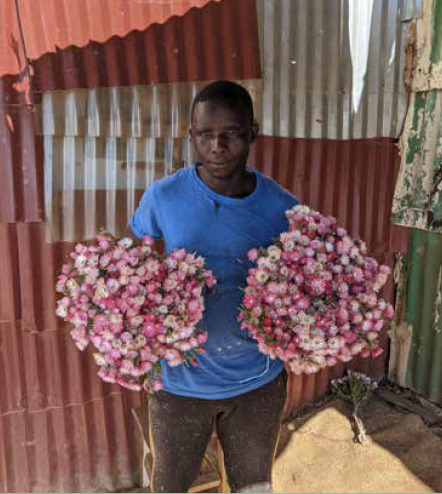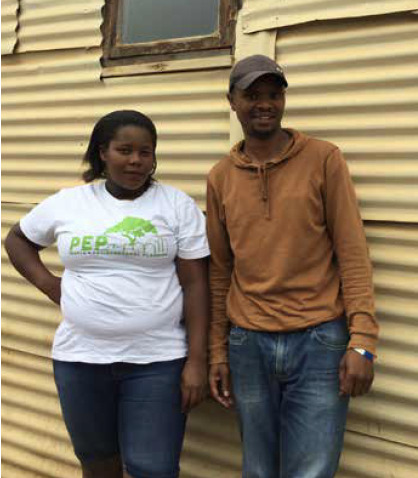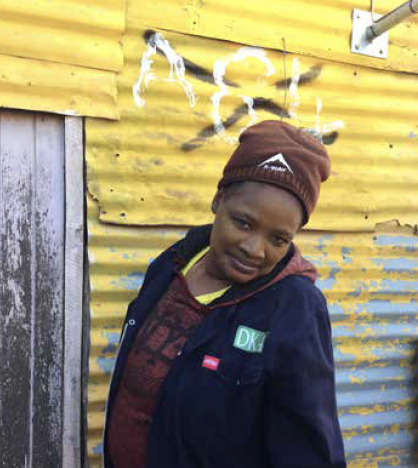Present and Visible: Napier Settlement and its Stories, a co-produced book by the MPhil Southern Urbanism cohort, community researchers and NGO People’s Environmental Planning (PEP) is structured on key themes that shape the settlement and stories of families living on it, their struggles and aspirations for homes and for better lives, for safe housing, for secure access to infrastructure, and for sustainable livelihoods. To build this focus, narratives of settlement families’ and their household’s histories are interspersed throughout the book. Critical themes emerged through our collaborative research, ranging from home building, and placemaking through gardening, to the challenges and possibilities of livelihoods such as farm work and self-run small businesses.
In this post we explore the theme of farm work. Farm work employs a significant portion of residents of the informal settlement. According to the enumeration carried out in 2019, 40 per cent of people in the settlement are engaged in farm work and 17 per cent in gardens. As we spoke to individuals and families and walked around the settlement, this was evident. Everyone knew someone or knew someone who knew someone who worked on a farm. Every time we entered a house, we found some members of the family had experience of working on the farm. Several times a day, a pick-up truck or bakkie comes to drop off or pick up labourers, and collects cleaned, arranged flowers. Farm work is not just done on farms, but also happens in the settlement, as well as in sheds in the vicinity. If you walk around in the middle of the day, you may see people cleaning and arranging flowers. When we visited, we saw residents working with light pink coloured, almost glass-like flowers. Flowers are an integral part of the settlement landscape. They are beautiful and stand out against the coloured metal sheets of the houses and the sky.
The stories of farm work, and of families for whom farm work is an important source of income, should be told and heard. While the settlement relies on farm work, the farms also rely on the people in the settlement. Residents are resourceful, as they piece together work, move across borders, and work together to support their families. The stories of some of these residents presented here speak for themselves.
MOSES CHIRWA
Moses Chirwa sat on a bench clutching a bouquet of flowers in each hand. He told us they were called filicoma flowers. Moses was in the middle of his workday in Napier’s informal settlement when we met him. He was cleaning and cutting the flowers that he had collected from a farm earlier that day. Moses is a short, stocky man who talks very fast. Laughing, he said, “Please come after…” While we stood there we noticed a bakkie driving around and later found this had been his boss about to arrive to collect the flowers. Moses was on a deadline to clean and bundle them before he arrived. Moses usually works in the settlement, but sometimes, if there are more flowers, he does his work at a nearby canteen. This job is not permanent, but “piece” or target work. He is paid by the jobs he completes, rather than hourly. Moses joined his brother in Napier two years ago, after searching for work in Cape Town with no success. His brother is also a farmworker. Moses is using the money he earns to build his own house in Malawi, and to support his family who stays there.
MEMORY SALIMA
Memory was sitting in her yard cleaning flowers when we first met her. She works in the settlement, cleaning and cutting flowers. In the morning, she and other farm workers go to the farm to pick up the flowers and bring them back to the settlement. She usually starts her day at 5 or 6am, when the bakkie picks her up, although the times are not strict. She has only been in Napier for a few months and came here to join her sister. She left four children back in Malawi and she works to send money back home for her children. In Malawi, she was also a farmer, planting vegetables, potatoes, bananas, and sugar cane. She hopes to go back someday.
BUYISWA MAYILA
In 2019, Buyiswa Mayaila started working at the Vierfontein Farm as a grape and berry picker. She heard about the job from a friend in settlement who is currently working on the farm as well. When Buyiswa went for the job interview, she wore her uniform from the previous farm she had worked at, De Kock Akker farm, where she had planted and harvested onions. Getting the job was easy, Buyiswa did not need any sort of qualification, all she needed was her ID document. Buyiswa’s daughter, Nolokulu is also currently employed on the same farm.
Despite having obtained the job easily, being happy that she is employed, and being respected by her boss because she “does her job correctly”, Buyiswa faces many challenges daily. Employment on the farm has always been seasonal for her; even after a year of working on the farm she has still not received an offer for a permanent post. Besides picking fruit, at times her job requires her to carry crates from one plot to another. Being outside, one of Buyiswa’s biggest fears is being attacked by snakes. Also transportation to and from work can be challenging, the bakkie is reliable in the morning, but in the evening sometimes it doesn’t come and Buyiswa and other employees have to walk back to the settlement after a long day of work. Since working on the farms, Buyiswa has always earned R18.00 per hour; an amount that has not been enough to support her family. Buyiswa has a son who is still attending school and a grandchild who attends day-care. Besides food and electricity for the house, these are extra expenses which need to be covered.
Buyiswa says, “You have to like everything you do on the farm – as what the boss tells you”. While she doesn’t mind the work, it’s not what she wants for her children and her grandchildren. She has bigger hopes for them, but she can’t make those choices for them.”
KEY FINDINGS
A history of the settlement shows many generations of spatially stretched families. Many young people had parents who came to Napier for work, while they stayed in Eastern Cape with their grandparents until they were older. Others came to Napier alone and left their parents in the Eastern Cape. For the Malawians we spoke to, some had to leave their children in Malawi. Their economic situation required this separation, in order for them to get jobs or to go to school. Family played a big role in the stories we heard. The money generated from farm work would go towards their children. Many people spoke about hoping for other possibilities and more choices for their children.
Payment for hard labour
People who work daily on farms are trying to make a living for their family – whether the family stay in the settlement or back home in the Eastern Cape or even Malawi. According to individuals who shared their experiences, there are different forms of payment for farm work. Some were paid on a weekly basis, some on a monthly basis, some in physical cash and others by bank cheque. Nonetheless, everyone raised concerns over the low payment associated with farm work. Some also highlighted the issue of irregularity of payments.
Work insecurities
Working on a farm in Napier, it appears, involves working just for the moment, for, at any point in time, you could lose that job. The seasonality of farm jobs was dependent on the fruits in season at that time and, more specifically, what was planted and produced during that time, whether it was barley, wheat or hops, for instance.
Hopes and aspirations
It is evident that, despite the harshness of working conditions, workers feel their work is not done in vain. Their true sense of security lies within the happiness of their family. Many of the farm workers place their happiness in their children’s futures.


